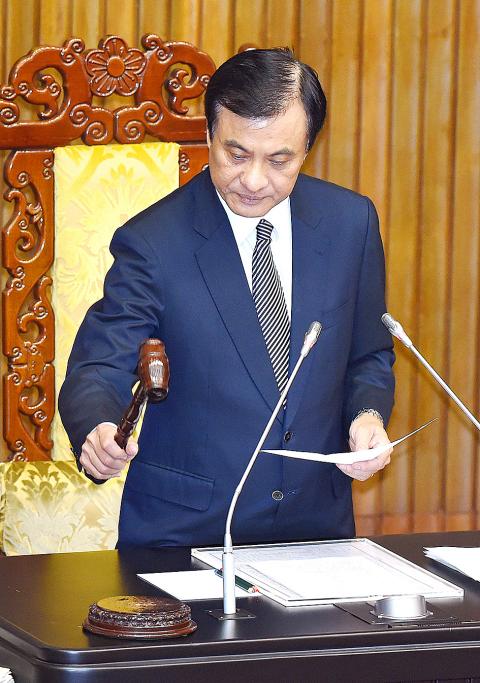Amendments to the HIV Infection Control and Patient Rights Protection Act (人類免疫缺乏病毒傳染防治及感染者權益保障條例) that allow organ transplants between HIV-positive people cleared the legislative floor yesterday.
The amendments would allow HIV-positive people to donate organs, bodily fluids, tissue or cells to other HIV carriers as long as the recipients sign an agreement to undergo the transplant.
The organs, bodily fluids, tissue and cells of people with HIV are otherwise unusable, and those who offer to donate such body parts to HIV-negative people would risk a fine of between NT$30,000 and NT$150,000, one amendment says.

Photo: Liao Chen-huei, Taipei Times
The amendments were proposed while taking into consideration the need for organ transplants by HIV-positive people and after referencing the US’ HIV Organ Policy Equity Act and successful organ transplants in the UK between HIV-positive people, the Executive Yuan said, explaining its version of the legislation.
As of Sept. 30 last year, there were 33,850 HIV-positive people in Taiwan, all of whom could be potential donors or recipients for organ transplants, said Chinese Nationalist Party (KMT) Legislator Arthur Chen (陳宜民), who helped push for the legislation.
Apart from the US and the UK, Spain has also allowed organ transplants between HIV-positive people, he said.
Japan, despite not having legalized organ transplants between HIV carriers, has had six successful such operations, which had no discernible difference in the survival rate of recipients compared with HIV-negative people, he added.
One of the amendments, initiated by Democratic Progressive Party Legislator Lin Ching-yi (林靜儀), says that although people with HIV are legally required to inform paramedics when seeking medical help that they are HIV-positive or risk a penalty, those who are unconscious, in a state of decreased consciousness or whose privacy would be infringed upon as a result of disclosing such information would be exempted from the regulation.

MAKING WAVES: China’s maritime militia could become a nontraditional threat in war, clogging up shipping lanes to prevent US or Japanese intervention, a report said About 1,900 Chinese ships flying flags of convenience and fishing vessels that participated in China’s military exercises around Taiwan last month and in January last year have been listed for monitoring, Coast Guard Administration (CGA) Deputy Director-General Hsieh Ching-chin (謝慶欽) said yesterday. Following amendments to the Commercial Port Act (商港法) and the Law of Ships (船舶法) last month, the CGA can designate possible berthing areas or deny ports of call for vessels suspected of loitering around areas where undersea cables can be accessed, Oceans Affairs Council Minister Kuan Bi-ling (管碧玲) said. The list of suspected ships, originally 300, had risen to about

DAREDEVIL: Honnold said it had always been a dream of his to climb Taipei 101, while a Netflix producer said the skyscraper was ‘a real icon of this country’ US climber Alex Honnold yesterday took on Taiwan’s tallest building, becoming the first person to scale Taipei 101 without a rope, harness or safety net. Hundreds of spectators gathered at the base of the 101-story skyscraper to watch Honnold, 40, embark on his daredevil feat, which was also broadcast live on Netflix. Dressed in a red T-shirt and yellow custom-made climbing shoes, Honnold swiftly moved up the southeast face of the glass and steel building. At one point, he stepped onto a platform midway up to wave down at fans and onlookers who were taking photos. People watching from inside

Japan’s strategic alliance with the US would collapse if Tokyo were to turn away from a conflict in Taiwan, Japanese Prime Minister Sanae Takaichi said yesterday, but distanced herself from previous comments that suggested a possible military response in such an event. Takaichi expressed her latest views on a nationally broadcast TV program late on Monday, where an opposition party leader criticized her for igniting tensions with China with the earlier remarks. Ties between Japan and China have sunk to the worst level in years after Takaichi said in November that a hypothetical Chinese attack on Taiwan could bring about a Japanese

The WHO ignored early COVID-19 warnings from Taiwan, US Deputy Secretary of Health and Human Services Jim O’Neill said on Friday, as part of justification for Washington withdrawing from the global health body. US Secretary of State Marco Rubio on Thursday said that the US was pulling out of the UN agency, as it failed to fulfill its responsibilities during the COVID-19 pandemic. The WHO “ignored early COVID warnings from Taiwan in 2019 by pretending Taiwan did not exist, O’Neill wrote on X on Friday, Taiwan time. “It ignored rigorous science and promoted lockdowns.” The US will “continue international coordination on infectious